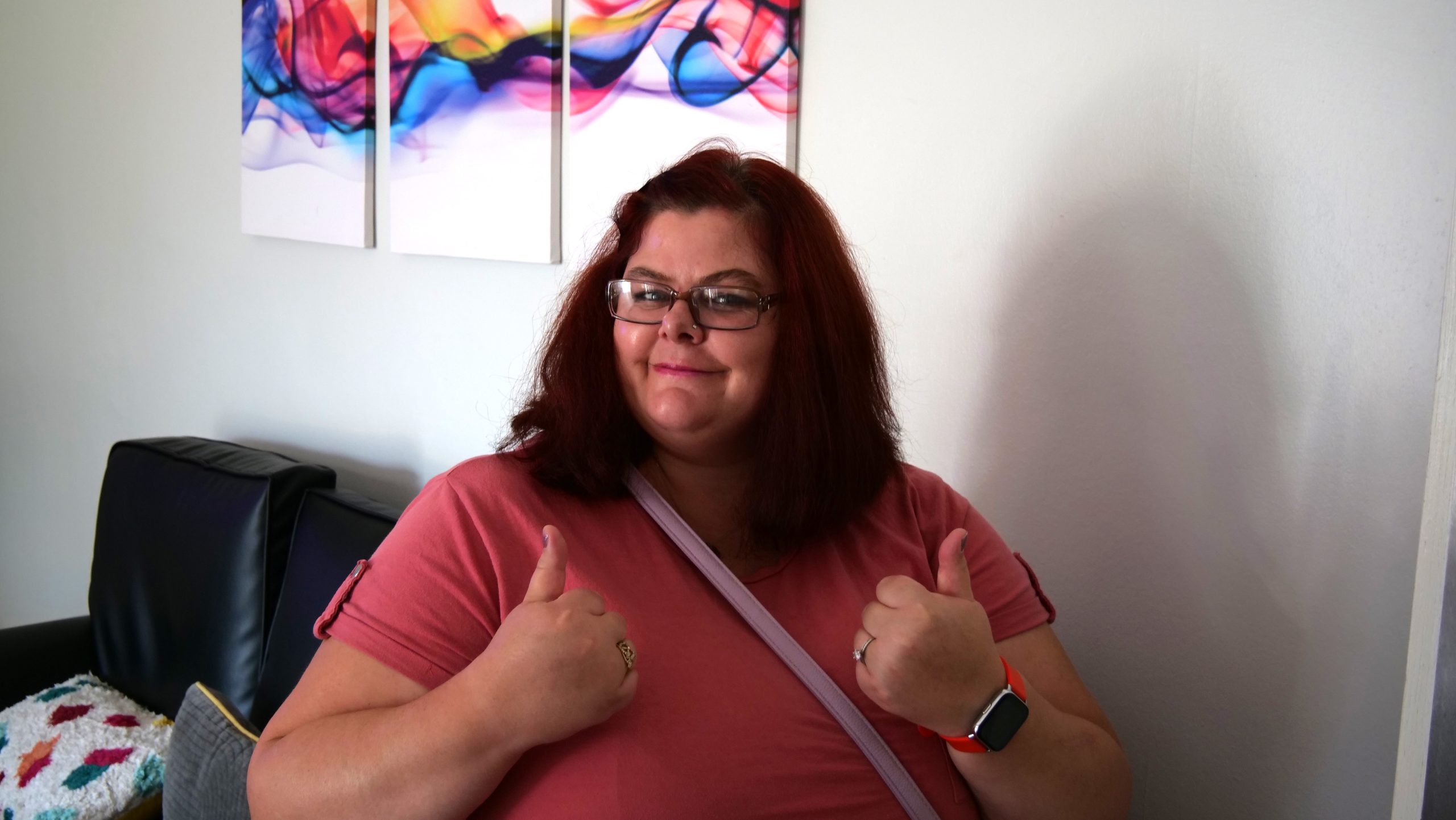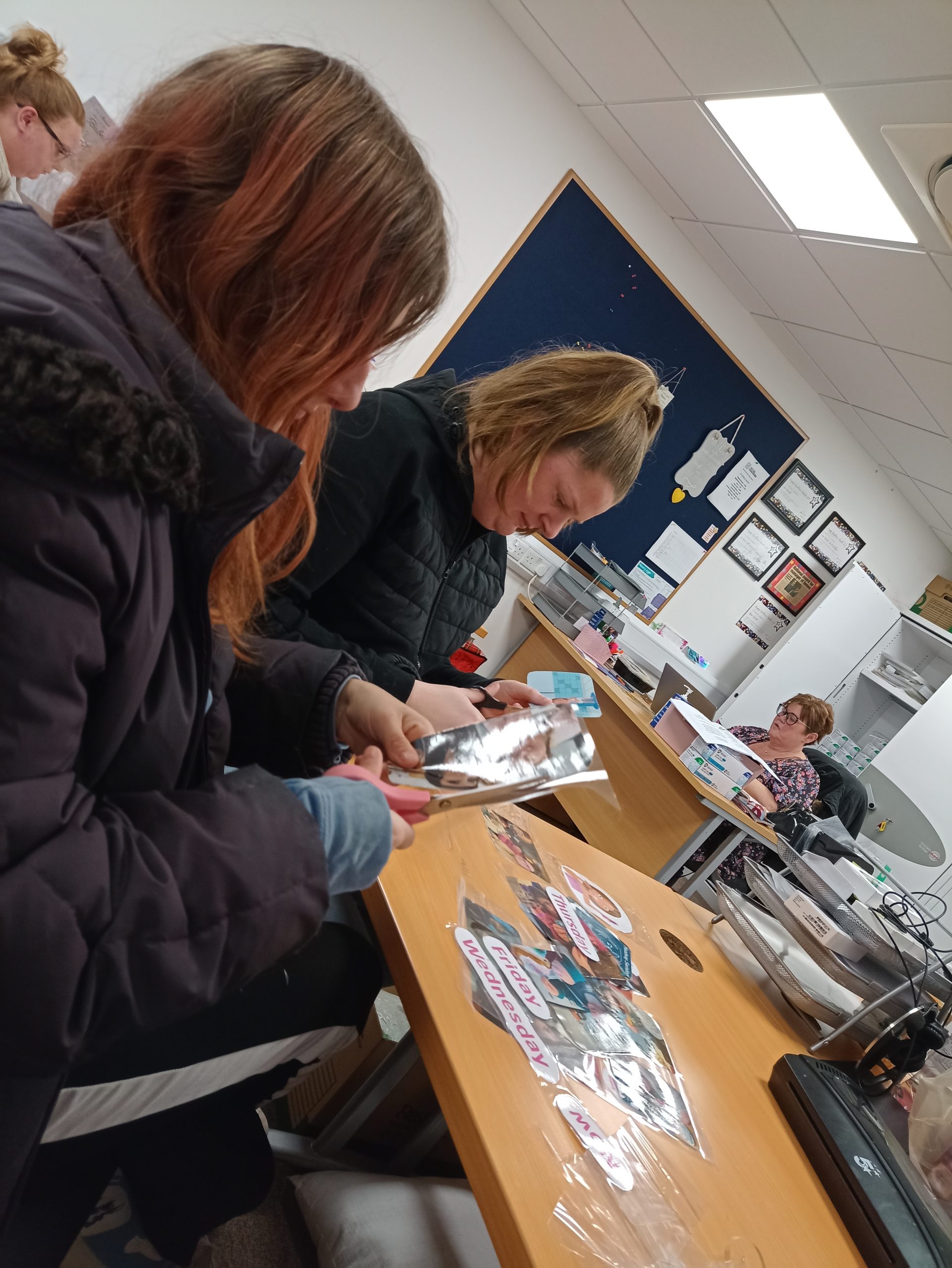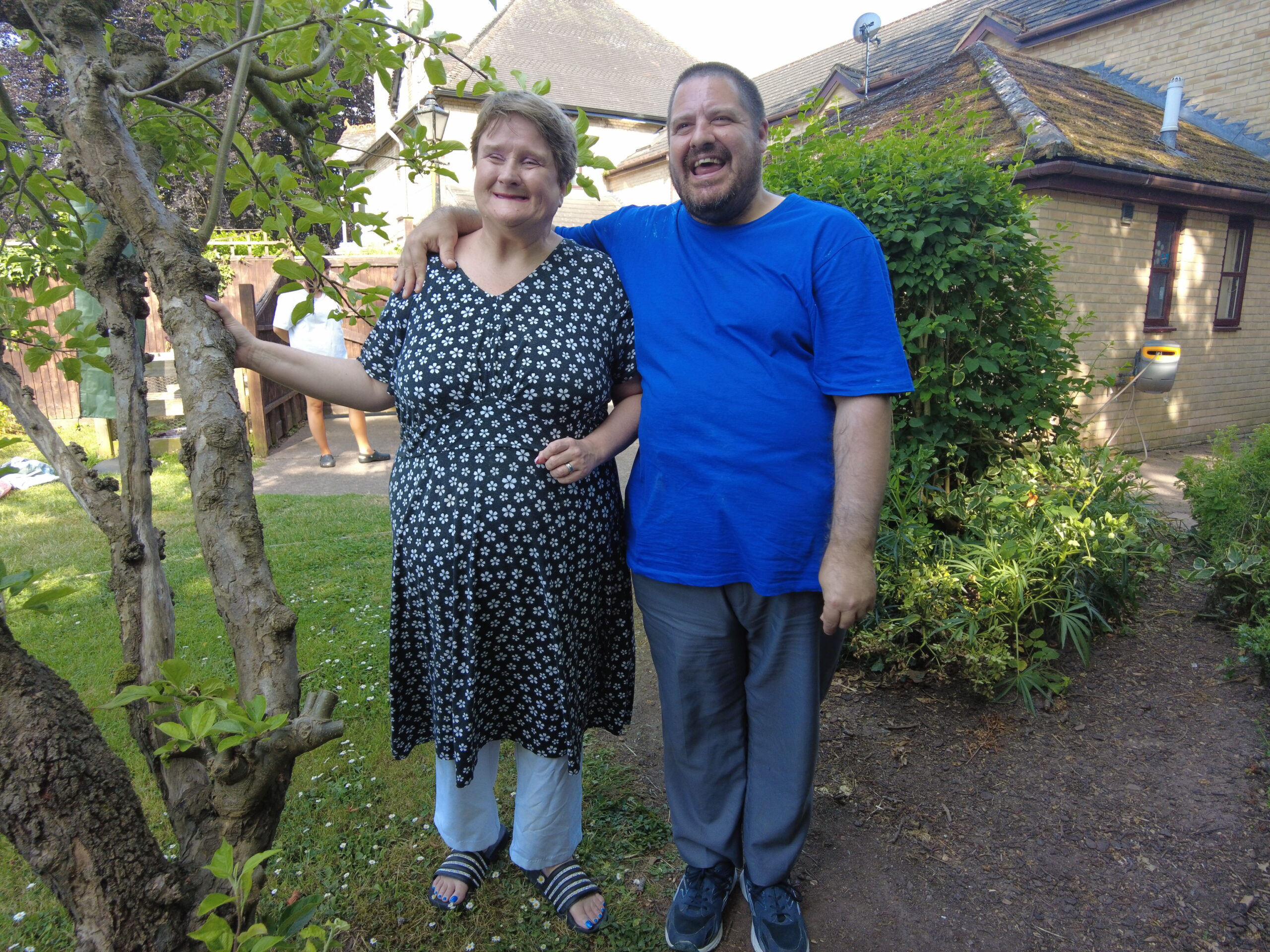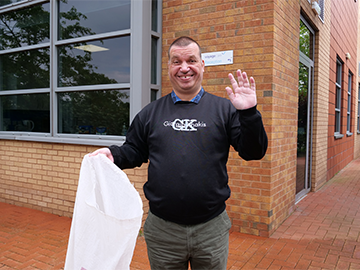Learning Disabilities Week 2024: Nurturing relationships for people with learning disabilities
Meaningful relationships foster a sense of happiness, security, and comfort, and they provide us with essential emotional support when we need it most. Yet it’s commonly misconceived that people with learning disabilities can’t sustain long-lasting, meaningful relationships with others.
However, people with learning disabilities can develop meaningful connections and nurturing relationships, as shown by many of the people we support.
To harness this, it’s important our teams understand everyone’s individual needs and the barriers they face. This way, we can provide specialist support to help those with learning disabilities to navigate social interactions and build meaningful relationships with friends, family, and romantic partners!
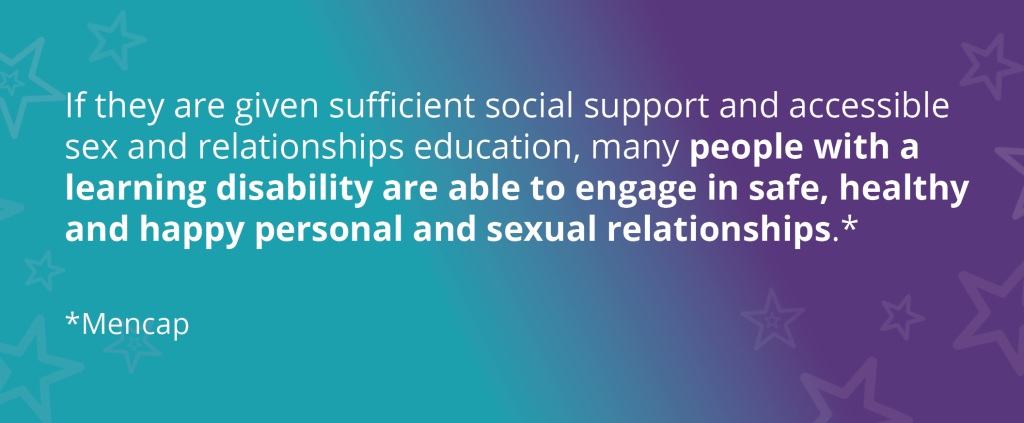
Overcoming barriers and building strong friendships
When building meaningful relationships, people with learning disabilities often face barriers around communication, and these struggles often result in social anxiety, forcing them to isolate themselves from social situations.
To overcome these barriers, our teams work closely with the people we support, empowering them with communication techniques they’re comfortable using to express themselves, in order to establish positive lines of communication.
We encourage the people we support to maintain communication in their relationships using modern technology – whether that’s arranging a Skype call to speak to family, reaching out to a friend for a walk, or planning a date night with someone special – whatever it looks like, we provide clear guidance and support!
Friendships, fish & chips
Woodham Grange is one of our residential care homes in County Durham. Recently, a gentleman joined our home after relocating to the area.
Our dedicated team got to know him and found out he had a friend who regularly joined him for fish and chips! Identifying this was important to him, they found out where his friend lived, and reached out to the team that supported him.
Ensuring their friendship didn’t slip away, the team at Woodham Grange arranged for the two friends to meet and have a chat over some fish and chips! Working together, the two teams ensured this friendship continued to blossom, and both gentlemen were happy to see each other again!
Getting back in the community
A person we support in Swadlincote was struggling to motivate themselves to meet new people and venture out into the community. Our team completed a person-centred review and referred her to the community connectors, a team who help people with learning disabilities access opportunities in the community.
Identifying how important social interactions were to her, they worked with her to find some potential activity clubs to visit, like a local art club, hoping she could make some new friends!
After visiting some clubs, the young lady established new friendships and now looks forward to frequently visiting her art club and seeing her new friends.
Connecting with family
When a person we support moves into one of our homes, it can be a worrying time for their family, evoking fears that they might grow apart as they won’t see them every day. Moving home can also be concerning for people with learning disabilities, causing distress as they navigate their new environment.
At Voyage Care, we understand that family is one of the most important things in a person’s life, so we ensure we offer the people we support avenues to maintain and nurture these relationships. Previously, we’ve supported people to rebuild relationships with their families and navigate new roles in family networks.
Rebuilding family relationships
Our team at Derby DCA were introduced to a lady moving into one of our homes, who had experienced a breakdown in her relationship with her father as she lived so far away from him.
Once settled in her new home, the team worked hard to rebuild this relationship as they knew how devastated the young lady was in losing her connection with her father.
Understandably nervous, the young lady passed over his contact details and we reached out to him. After introducing ourselves, we encouraged him to visit the service to start rebuilding this important relationship.
At the same time, the young lady was also in a relationship, which has since become long distance due to her move. We’ve empowered her to maintain her relationship by encouraging evening phone calls and arranging meetings for the couple to see each other, with our team and family on hand for added support.
Reaching out to family all over the world!
Michael from Woodham Lodge has been able to get back in touch with his family who live across the globe in Canada and New Zealand with our specialist support!
Due to the distance, Michael’s relationships started to slip, and he didn’t communicate with his family very often – only receiving the odd letter and photograph, which he loved to look at!
The team at Woodham Lodge knew how much Michael missed his family and how much they meant to him, so they decided to help Michael connect with them. They supported Michael to save some money and buy his own laptop. They then supported him to set up his own Skype account and added his overseas family members.
The team now work with his family to arrange a suitable time to talk allowing Michael the opportunity to have regular chats with them and see them face to face through Skype! And even though his sister in New Zealand doesn’t have Skype, the team support Michael to write letters and send them off at the Post Office.
In the past, Michael has felt down over how much he misses his family. Feeling separated, the little contact he had with them took an emotional toll on him. But being able to see them through video call has meant the world to him. He has even been able to meet his great nephew through their Skype calls!
Finding happiness in a loving partner
When it comes to romantic relationships for people with learning disabilities, it’s important to look at people as individuals and not generalise the support they might need. Each person is unique, and their support needs will vary – that includes their relationships too!
Our teams know that the people we support are vulnerable and might not always spot if someone’s treating them unfairly. That’s why we recognise the importance of teaching the people we support about boundaries and what it means to be in a healthy, consenting relationship.
New beginnings for Shona
Shona is a person we support at Ruddington View, one of our residential care homes in Nottinghamshire. After a rocky relationship, Shona found love again. With the support of the team, Shona’s flourishing with her new partner. Fostering a safe, happy, and loving relationship, Shona’s now engaged! She’s building her independence in one of our self-contained flats, equipping her with the confidence to eventually move in with her partner.
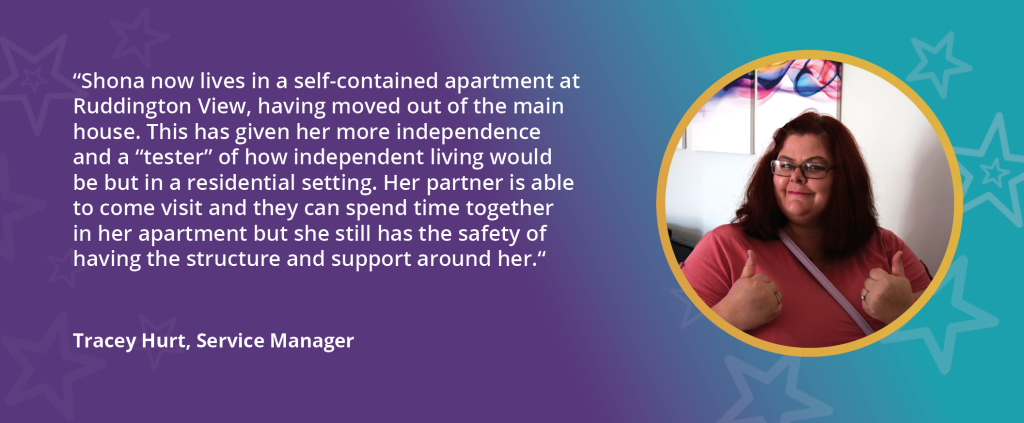
In the past, Shona had been in a very unhealthy relationship, and experienced different forms of abuse. This had an enormous impact on how Shona viewed relationship roles. Knowing how important Shona’s new relationship was to her, the team at Ruddington View worked with Social Workers to transform this view. They helped her understand what a healthy relationship was and what a positive experience romantic relationship can be!
The team knew her past relationship had knocked her confidence and had frequent chats with her about what a healthy relationship is, empowering her to understand the importance of putting her own safety and happiness first. This helped her express thoughts and feelings with her partner, and she now understands the importance of having a voice in her partnership.
When it comes to her relationship, Shona chooses how much support she receives. Sometimes, she prefers privacy when spending time with her partner, and other times she prefers the supervision of her support team when he visits. She also enjoys visiting her partner in his apartment, where they often share romantic meals together!
With the support of her team at Ruddington View, Shona’s now in a happy, healthy relationship, and has come a long way in her self-confidence journey.
Everybody needs meaningful relationships
Relationships with family, friends and romantic partners can have a huge effect on how we feel about ourselves and the world around us. They can bring a sense of belonging and happiness to our lives and often make us feel whole.
Promoting these relationships for people with learning disabilities is important, and at Voyage Care, we make this a priority. We ensure healthy relationships are supported and encouraged to the people we support by:
Individual Assessment
Understand each person’s unique needs, preferences, and aspirations. Consider their communication abilities, emotional needs, and personal goals.
Proper documentation
Develop personalised support plans that enhance their quality of life, including relationships.
Privacy
Ensure people we support have private spaces to spend time with their partners.
Dignity
Respect their autonomy and choices regarding relationships.
Relationship Education
Provide information about healthy relationships, consent, boundaries, and safe practices.
Empowerment
Encourage self-advocacy and decision-making related to relationships.
Family and Friends
Involve families and friends in supporting the relationship.
Peer Support
Connect people we support with peer support groups or forums where they can share experiences and advice.
Understanding Consent
Ensure that people we support understand consent and can express their preferences.
Setting boundaries
Create awareness of personal boundaries and respect for others’ boundaries.
Safe Practices
Provide information about safe sexual practices and protection.
Health Monitoring
Regularly assess their health and well-being.
Relationship Training
Train colleagues on supporting relationships, addressing intimacy-related questions, and handling challenges.
Non-Judgmental Attitude
Encourage staff to be non-judgmental and supportive.
Advocate for Rights
Ensure the rights of people we support to relationships, intimacy, and sexual expression are respected.
Legal Protections
Be aware of legal protections related to relationships for individuals with learning disabilities.
Find specialist support near you!
To find out more about our specialist support and how we can help you, a client, or a loved one, fill out our quick form and a member of the team will get back to you.

 Learning disabilities
Learning disabilities  More success stories
More success stories 
